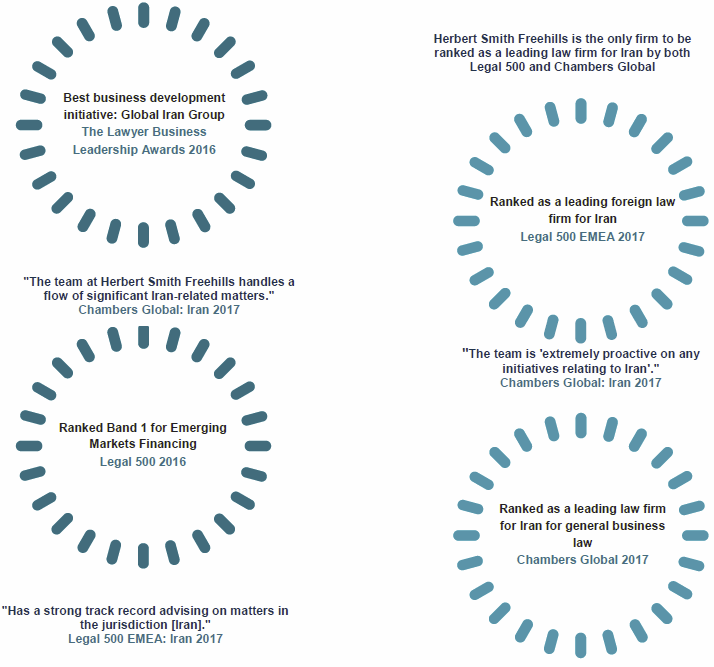This update provides an overview of key developments which have occurred in Iran during the past month and highlights areas of future interest. In particular, the update covers notable developments in the political arena and key economic sectors.
1. Political developments
- US army general supports the nuclear deal – a senior US army general has signalled his support of the Iran nuclear deal, stating that the Joint Comprehensive Plan of Action (JCPOA) addresses one of the principle threats that the US faces with Iran. According to General Joseph Votel, head of the US military's central command, withdrawing from the JCPOA, as US President Donald Trump has threatened to do, would leave the US needing to find another way to deal with Iran's nuclear weapons programme.
- US appoints new secretary of state and national security adviser – On 13 March 2018, US President Donald Trump replaced Rex Tillerson as secretary of state with Mike
Pompeo, director of the US Central Intelligence Agency. Just over a week later, President Trump then appointed John Bolton as national security adviser in the place of H R McMaster. Pompeo was fiercely critical of the JCPOA during his time as a congressman, while Bolton has also criticised the JCPOA and has separately advocated using military force against Iran.
- French reaffirm the nuclear deal – France's foreign minister visited Iran to reaffirm European support for the JCPOA, but at the same time echoed the concerns of the US about Iran's role in regional conflicts and Iran's ballistic missile programme. France, Britain and Germany have reportedly proposed that new EU sanctions be imposed in respect of Iran's ballistic missile programme in an attempt to encourage the US to keep the JCPOA in force.
- Saudi Arabia will develop nuclear deterrent if Iran does – Saudi Arabian Crown Prince Mohammed Bin Salman has said that Saudi Arabia will develop a nuclear bomb in response to Iran doing so. The two countries have been locked in a regional power struggle, including in respect of the wars in Yemen and Syria.
- US sanctions Iranians involved in global cyber-attacks – Nine individuals and an Iranian company have been charged and sanctioned by the US in relation to cyber-attacks which began in 2013, taking more than 31 terabytes of academic data and intellectual property from 144 US universities and 176 universities in other countries. The US Department of Justice has reportedly privately warned major internet infrastructure companies to expect further attacks from Iran.
2. Developments in key economic sectors
Finance
- Sweden's Serkland to invest in Iran's Mohed – Swedish investment company Serkland Group is on course to make an investment into Iranian plastic packaging company Moheb. The deal will see Serkland taking a minority stake in Moheb.
- Central Bank Chief hails economic growth – according to local press, the Governor of the Central Bank of Iran (CBI) announced at the CBI's 57th annual general assembly that the rate of economic growth in the previous Iranian calendar year had reached 12.5%. The Governor said that he expects the rate of growth to continue rising following the adoption of strict monetary and fiscal measures.
- Iranian car plant opening in Azerbaijan – Iran's economy minister has reportedly announced (after a session of a joint commission on Iran-Azerbaijan cooperation) that Iran will open an automobile factory in Azerbaijan.
Oil and Gas
- Zarubezhneft oil contracts – the National Iranian Oil Company (NIOC) has signed a memorandum of understanding with Russian oil company Zarubezhneft in relation to the Susangerd oil field. Susangerd oil field, located 45 km from the southwestern city of Ahwaz, is a newly discovered oil field in Iran and according to preliminary estimates, will be able to produce 30,000 b/d of crude oil.
- NIOC to hold oil tenders for $5 billion – the managing director of NIOC, Ali Kardor, said that the company has prepared bidding documents for a package of about US$5 billion-worth of maintenance and enhancement projects. It is expected that tenders will take place in the next calendar year.
- Iran and Iraq oil truck plan delayed – Iran and Iraq's agreement to swap up to 60,000 barrels crude oil from Kirkuk with Iranian oil has been postponed due to security concerns.
- Gas production doubles at South Pars – according to Iranian state media, Iranian President Hassan Rouhani recently announced that the gas production at South Pars increased from 285 million cubic metres to 555 million cubic metres in the past Iranian calendar year.
- NIOC announces early output from Azar oil field – current output from the Azar oil field, at which production started last March, has reached 30,000 b/d. The manager of the Azar field reportedly stated that he expects output to reach 65,000 b/d later this year as the second train of processing installations becomes operational. He also highlighted the positive role of the JCPOA in the development of the field, as more than 10 wells were completed to allow early production after the implementation of the JCPOA in January 2016.
Other
- Louvre show at Iran's National museum – more than 50 artworks from the Louvre collection have arrived in Tehran to be displayed in celebration of the museum's 80th anniversary. The items include a 2,400-year old Egyptian sphinx, a bust of Roman emperor Marcus Aurelius and drawings by Rembrandt and Delacroix. The cultural ties between Iran and France have strengthened since a cultural exchange agreement was signed when President Rouhani visited Paris in January 2016.
- Direct flights to Serbia resume – according to Serbian media, direct flights between Serbia and Iran resumed recently, after a 27-year gap, when an IranAir plane landed in Belgrade's Nikola Tesla airport. Iran Air will be offering the route twice-weekly and according to the Serbian reports, all of the flights until the end of summer are fully booked.U.
What others say about us
